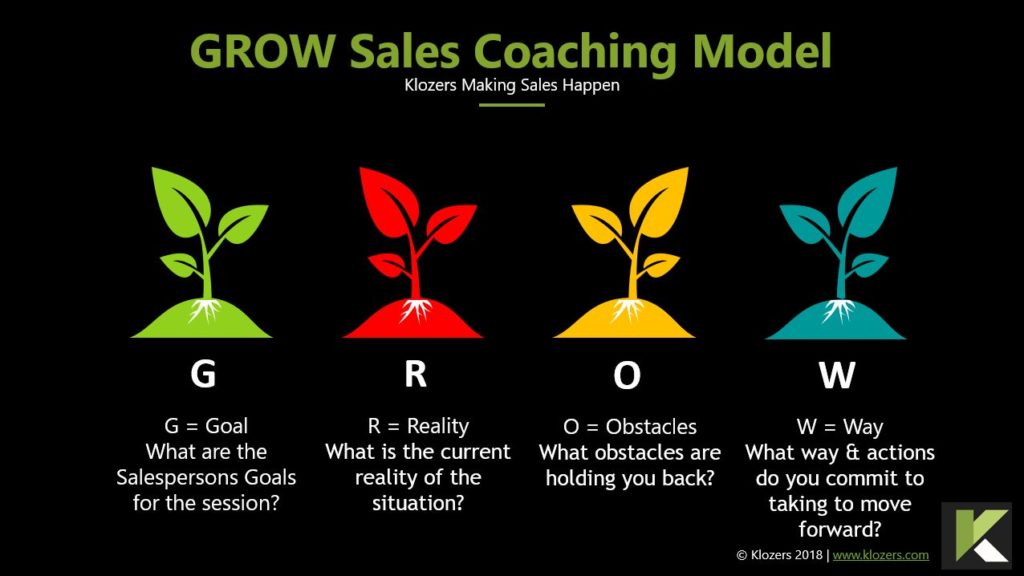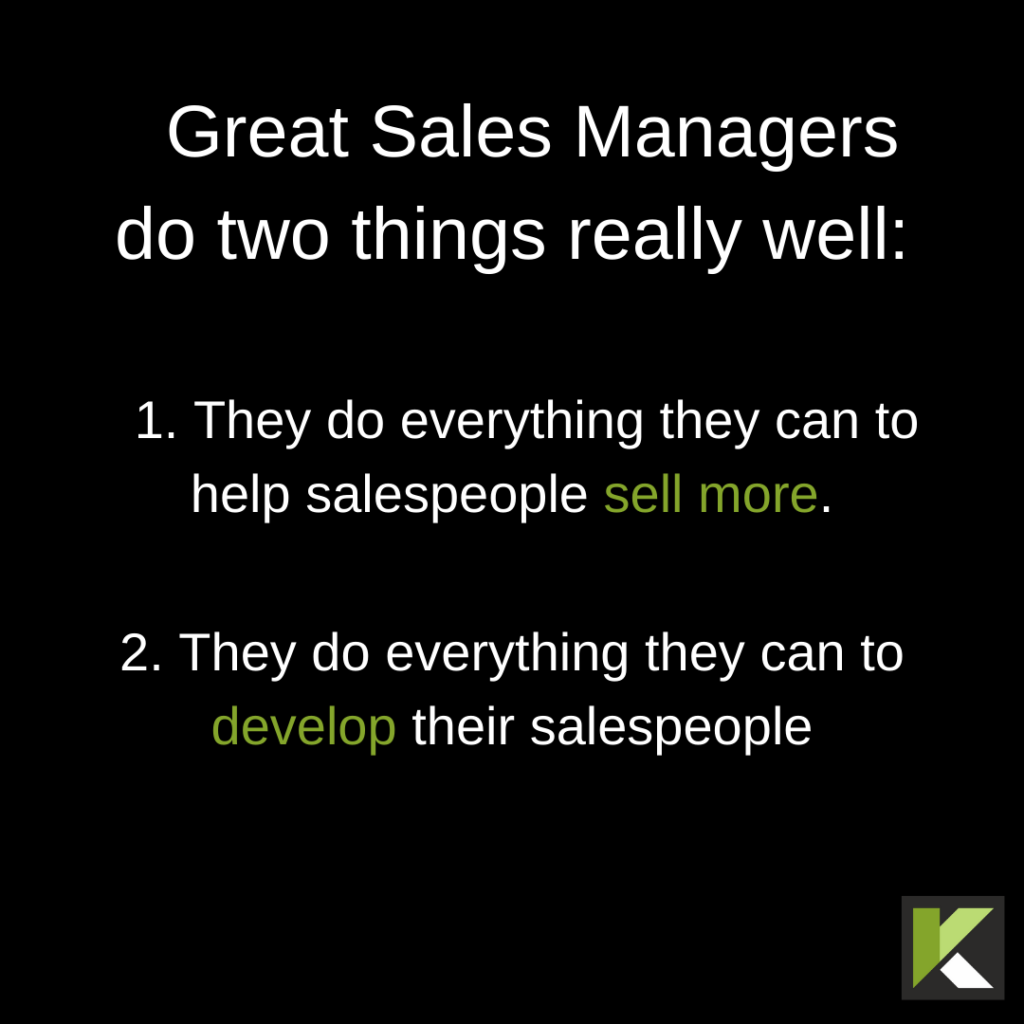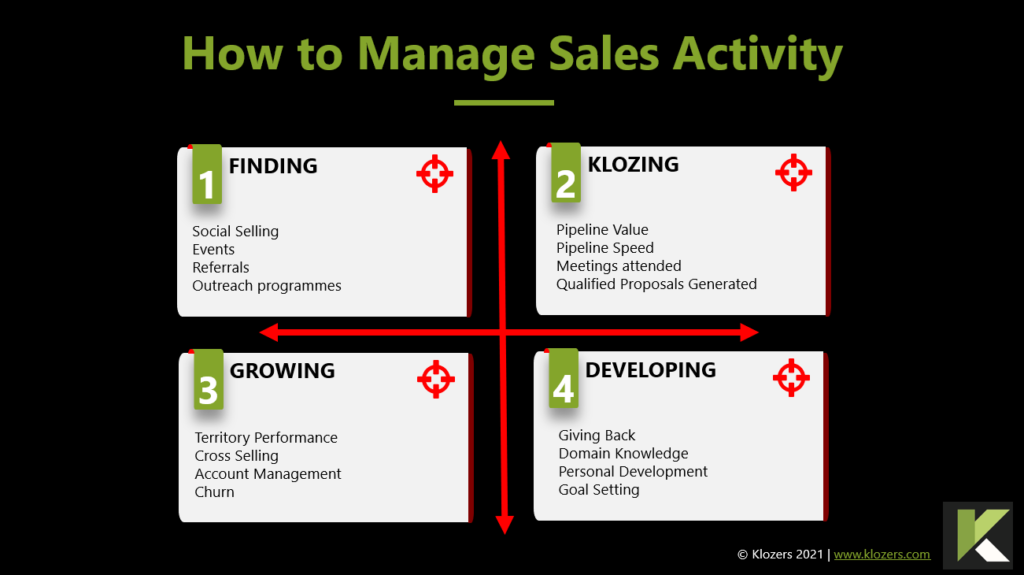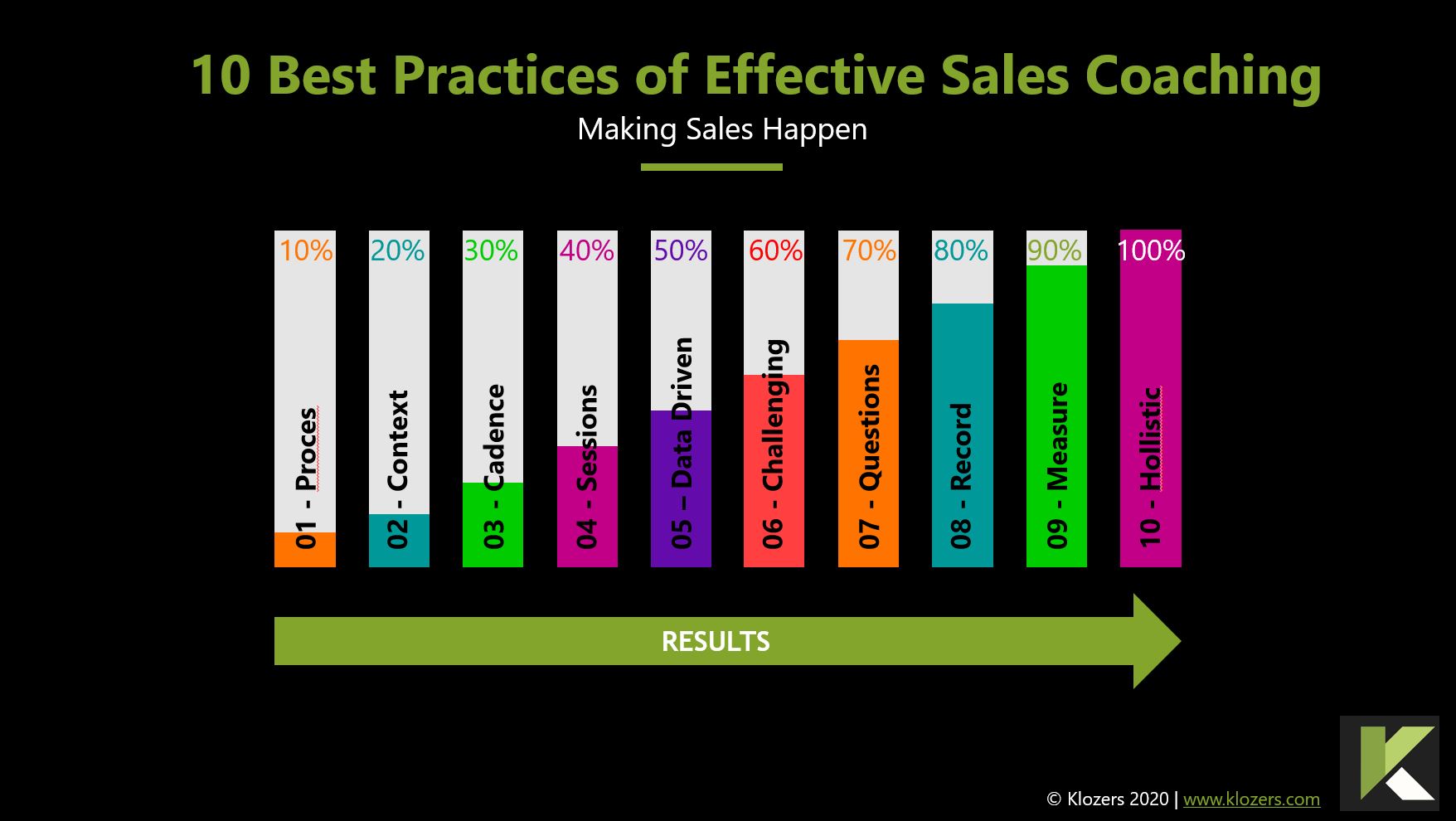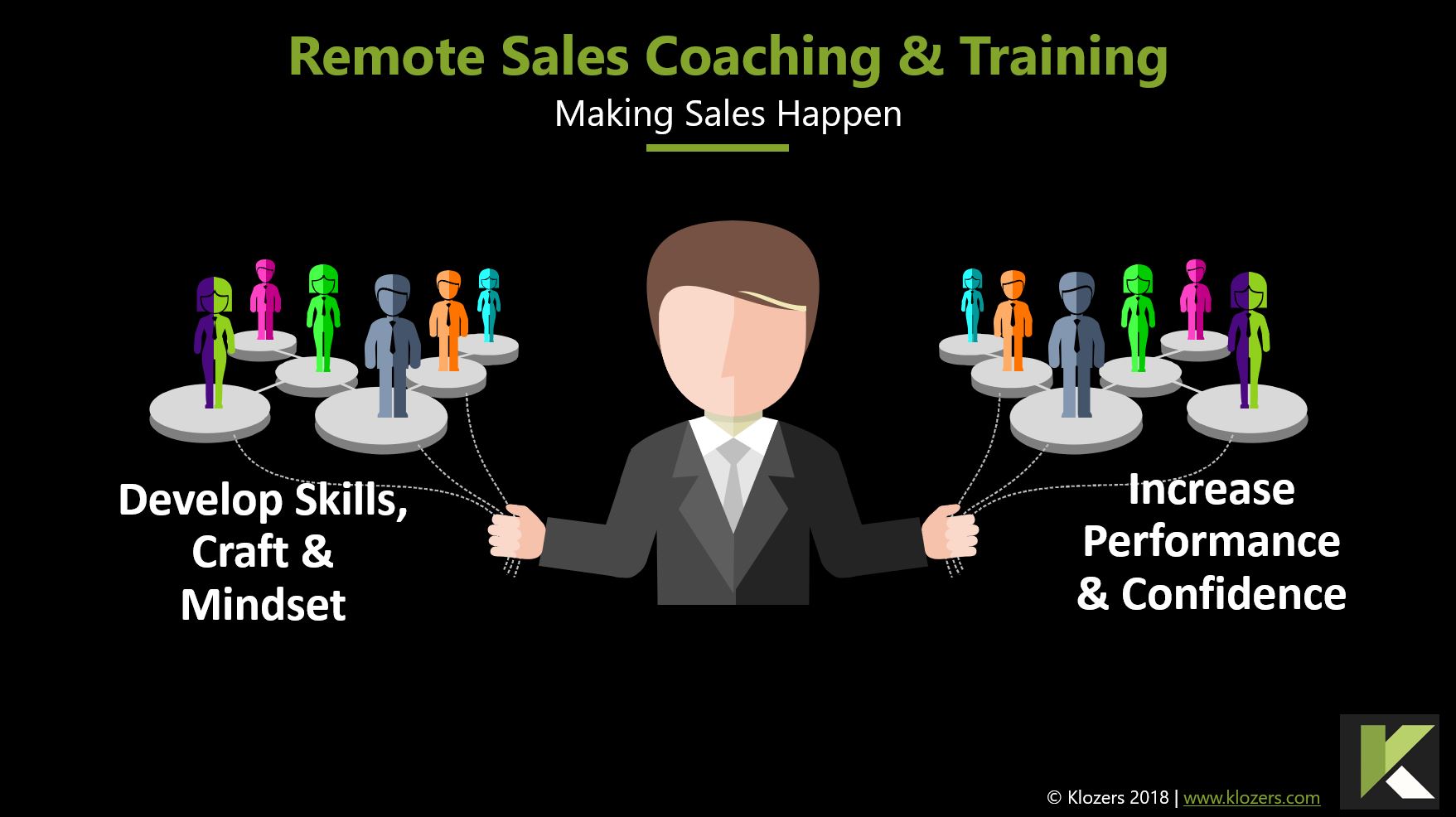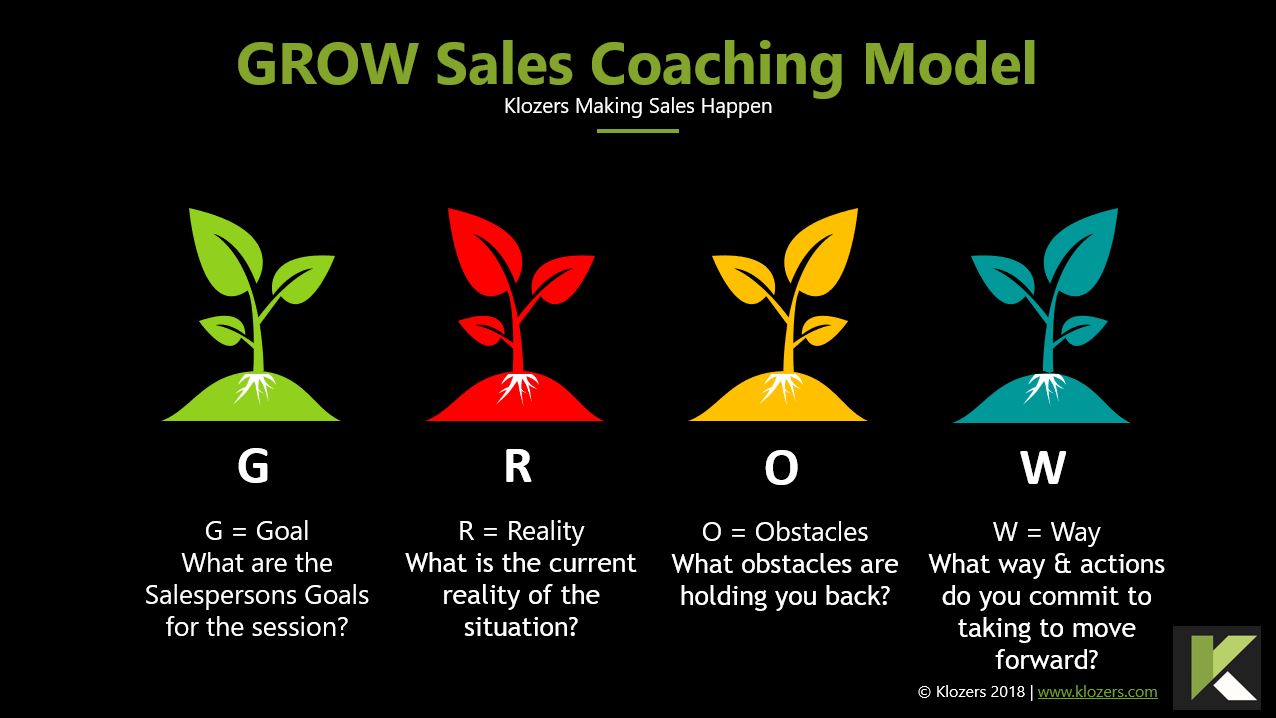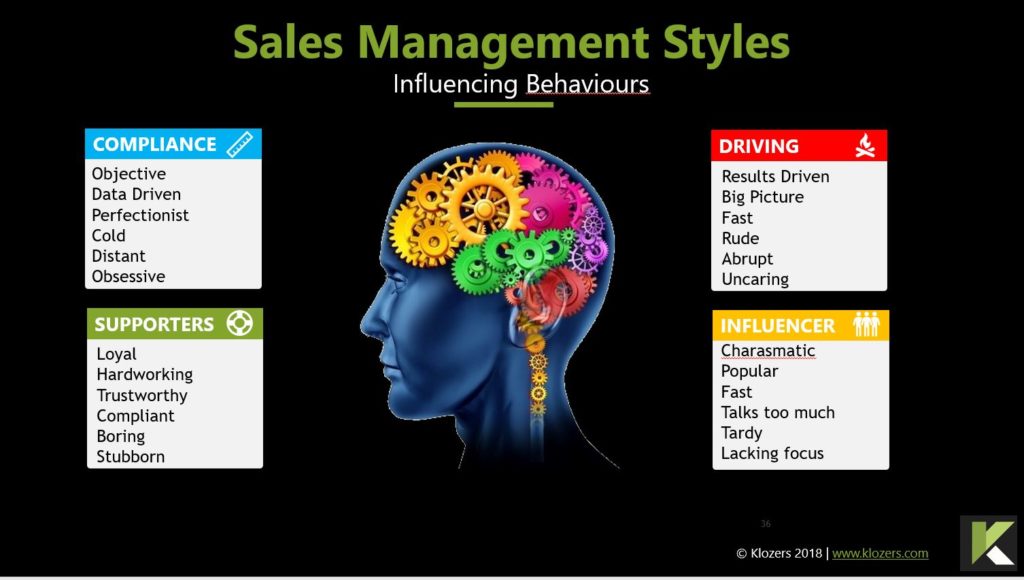Unleash your Sales Potential | Hire a Sales Coach
Sales Coach - Top Question from Google
What is a Sales Coach?
A sales coach is a professional who helps sales professionals develop their skills and knowledge, with the goal of improving their sales performance. Sales coaches may work with individuals or small groups of sales reps, and may use a variety of techniques, such as one-on-one coaching, role-playing, and interactive activities to help sales professionals develop the skills and knowledge they need to be successful.
Sales coaches may focus on a range of topics, including sales strategy, sales techniques, customer relationship management, communication skills, and problem-solving. They may also work with sales leaders, sales managers and sales professionals to identify and overcome any personal or professional challenges that may be hindering their sales performance.
Sales coaches are typically experienced sales professionals themselves, with a proven track record and may have a background in sales management or training. They may work with sales professionals at all levels, from entry-level salespeople to experienced sales managers and sales leaders.
Overall, a sales coach can be a valuable resource for sales professionals who are looking to improve their skills and increase their sales performance.
In this article we will cover...
There’s a new way to deliver sales growth…
Don’t buy Sales Training until you’ve watched this video…
1. What are the benefits of sales coaching?
Sales coaching can offer a range of benefits to sales professionals, sales managers and organizations as a whole, including:
a) Improved sales performance: By helping sales professionals develop their skills and knowledge, sales coaching can help improve their sales performance. This may include increased sales revenues, higher conversion rates, and better customer satisfaction.
b) Increased confidence and motivation: Sales coaching can help sales professionals feel more confident and motivated in their roles, which can lead to improved performance.
c) Personalized development: Sales coaching is typically more personalized than sales training, as it is tailored to the specific needs and goals of the individual or small group. This can make it more effective in helping sales professionals develop the skills and knowledge they need to be successful.
d) Greater accountability: Sales coaching often involves setting specific goals and tracking progress, which can help sales professionals stay accountable and motivated to achieve their objectives.
e) Enhanced team culture: Sales coaching can help foster a positive and supportive team culture, which can lead to improved collaboration and teamwork.
Overall, sales coaching can be a valuable resource for sales professionals and organizations looking to improve sales performance and achieve long-term success.
2. The business case for sales coaching
Here are a few statistics that support the need for sales coaching:
a) Companies that invest in sales coaching see an average of 8.9% sales increase: According to research by the Corporate Executive Board, companies that invest in sales coaching see an average sales increase of 8.9% within the first year.
b) Salespeople who receive coaching are more likely to hit their targets: Research by the Sales Executive Council found that salespeople who receive coaching are 63% more likely to hit their targets compared to those who do not receive coaching.
c) Coaching leads to increased productivity: A study by the International Coach Federation found that coaching leads to a productivity increase of 86%.
d) Coaching leads to improved employee retention: According to research by the Corporate Executive Board, companies with high-quality coaching programs have a 7% lower turnover rate compared to those without coaching programs.
e) Coaching leads to better customer satisfaction: A study by the Corporate Executive Board found that companies with high-quality coaching programs have a 13.5% higher customer satisfaction rate compared to those without coaching programs.
These statistics demonstrate the significant impact that sales coaching can have on sales performance, productivity, employee retention, and customer satisfaction.

3. Individual sales coaching vs Group sales coaching
Individual sales coaching involves working with a single sales professional on a one-on-one basis to help them develop specific skills and knowledge. This type of coaching is typically more personalized and tailored to the specific needs and goals of the individual.
Individual coaching may be conducted in person or virtually, and may involve a range of topics such as sales strategy, business development and sales calls. An effective sales coach would also deliver one on one sessions on techniques, sales cycle, controlling sales conversations, role-playing, interactive activities, and feedback sessions. A sales coaches job is to help build confidence and encourage sales reps to reflect on their own sales performance.
It’s not the role of the sales coach to motivate reps. Top performers in sales are self motivated not just by revenue goals and more sales, but by their own professional development.
Group coaching, on the other hand, involves working with a small group of sales professionals to help them develop their skills and knowledge. Group coaching may be conducted in person or virtually, and may involve a range of techniques, such as group discussions, interactive activities, and role-plays.
Group coaching can be an effective way to help sales professionals learn from one another and share best practices. An effective sales coach may attend team meetings, support weekly sales meetings and drive performance improvement across the sales team.
Overall, both individual and group coaching can be effective approaches to sales development, and the most appropriate approach will depend on the specific needs and goals of the sales team or individual, as well as the resources and time available for development.
4. How do I create a sales coaching programme
Creating a sales coaching program can be a complex process that requires careful planning and attention to detail. Here are some steps to consider when creating an effective sales coaching program:
a) Define your goals: Clearly define your goals for the coaching program. What do you want to achieve? What specific skills or knowledge do you want to develop in your sales team? Having clear goals will help you design a program that meets your needs and helps you achieve your objectives.
b) Identify your target audience: Determine who your coaching program will be for. Will it be for your entire sales team, or just a specific group? Understanding your target audience will help you tailor the program to meet their specific needs and goals.
c) Determine the format: Decide on the format of your coaching program. Will it be in-person, virtual, or a combination of both? Consider factors such as convenience, cost, and the preferences of your target audience when choosing a format.
d) Select a coach: Choose a coach who has the experience and expertise to meet your needs. Consider factors such as their background, their coaching style, and their availability when selecting a coach.
e) Create a schedule: Determine the frequency and duration of your coaching sessions. Will they be weekly, biweekly, or monthly? How long will each session be? Consider the schedules of your participants and the goals of your program when creating a schedule.
f) Plan the content: Design the content of your coaching program to meet your specific goals and the needs of your target audience. This may include topics such as sales techniques, customer relationship management.
5. How do you coach a sales person?
Coaching a salesperson can be a rewarding and challenging experience, as it requires strong communication skills, a deep understanding of sales techniques, and the ability to adapt to the individual needs and goals of the sales rep. Here are some steps to consider when coaching a salesperson:
a) Establish a relationship of trust and respect: Building trust and respect is essential for any coaching relationship. This may involve establishing clear expectations, being open and honest with feedback, and showing genuine interest in the salesperson’s development.
b) Identify the salesperson’s strengths and areas for improvement: Assessing the salesperson’s strengths and areas for improvement can help you tailor your coaching to their specific needs and goals. This may involve observing their sales interactions, reviewing their performance data, and asking for feedback from the salesperson and their colleagues.
c) Set specific, measurable goals: Setting specific, measurable goals can help the salesperson stay focused and motivated, and can provide a roadmap for their development. Consider setting both short-term and long-term goals, and be sure to track progress regularly.
d) Provide ongoing support and feedback: Offer ongoing support and feedback to help the salesperson develop their skills and knowledge. This may involve one-on-one coaching sessions, role-playing, or other interactive activities that allow the salesperson to practice and apply what they have learned.
e) Encourage self-reflection and continuous learning: Encourage the salesperson to reflect on their performance and seek out opportunities for continuous learning. This may involve encouraging them to read industry publications, attend training.

6. What are the best sales coaching techniques?
There are a wide range of sales coaching techniques that can be effective in helping sales professionals develop their skills and knowledge. Here are a few examples:
a) One-on-one coaching: One-on-one coaching involves working with a sales professional on a one-on-one basis to help them develop specific skills and knowledge. This type of coaching is typically more personalized and tailored to the specific needs and goals of the individual.
b) Role-playing: Role-playing involves simulating real-life sales situations and allowing the sales professional to practice and apply what they have learned. This can be a useful technique for helping sales professionals develop their communication and problem-solving skills.
c) Interactive activities: Interactive activities, such as case studies or simulations, can be a useful way to engage sales professionals and help them apply their knowledge to real-world situations.
d) Group coaching: Group coaching involves working with a small group of sales professionals to help them develop their skills and knowledge. Group coaching may involve group discussions, interactive activities, and role-plays, and can be an effective way to help sales professionals learn from one another and share best practices.
e) Feedback sessions: Providing ongoing feedback can be a valuable technique for helping sales professionals improve their performance. Feedback sessions should be conducted in a constructive and supportive manner, and should focus on specific areas for improvement.
Overall, the best sales coaching techniques will depend on the specific needs and goals of the sales team or individual, as well as the resources and time available for development.
7. Examples of sales coaching questions
There are a wide range of sales coaching questions that can be effective in helping sales professionals develop their skills and knowledge. Here are a few examples:
-
What are your specific goals for this coaching session?
-
What are your current challenges in the sales process?
-
What do you feel confident about in your sales approach?
-
What are your areas for improvement in your sales approach?
-
How do you currently handle objections from prospects?
-
How do you currently build relationships with prospects and customers?
-
How do you currently follow up with prospects and customers?
-
How do you currently measure your sales performance?
-
What are some best practices or strategies that have worked well for you in the past?
-
What resources or support do you need to achieve your goals?
Sales coaching questions should be tailored to the specific needs and goals of the sales professional or small group, and should be designed to encourage reflection, learning, and action. By asking thoughtful and targeted questions, sales coaches can help sales professionals identify areas for improvement, develop new strategies and approaches, and track their progress towards their goals.
8. What skills does a sales coach require?
A good Sales coach requires a range of skills to effectively coach sales reps including:
a) Sales expertise: Coaches should have a deep understanding of sales techniques, customer relationship management, and the sales process. This may involve having a background in sales management or training, or having extensive experience as a sales professional.
b) Communication skills: Coaches should have strong communication skills, including the ability to listen actively, ask clarifying questions, and provide feedback in a constructive and supportive manner.
c) Coaching skills: Coaches should have a strong understanding of coaching principles and techniques, including how to set goals, provide feedback, and facilitate learning and development.
d) Adaptability: Coaches should be able to adapt to the specific needs and goals of the salespeople they are working with, as well as to any changes in the sales environment.
e) Empathy: Coaches should be able to show empathy and understanding for the challenges and concerns of the salespeople they are working with, which can help build trust and rapport.
By developing these skills, coaches can become more effective at helping sales professionals develop their skills and knowledge, and improve their sales performance.
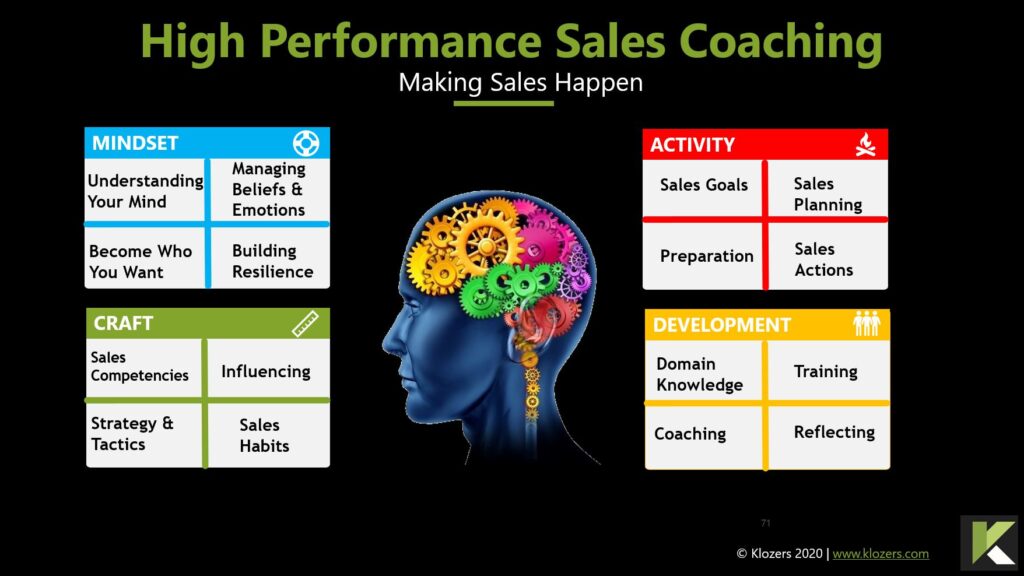
9. Does a sales manager need a sales coach?
Sales managers can benefit from sales coaching just like sales professionals can. In fact, sales coaching can be especially valuable for every sales manager, as they often have a greater responsibility for leading and developing their sales teams.
Sales coaching can help a sales manager develop a range of skills, including:
Leadership skills: Sales coaching can help sales managers develop their leadership skills, such as communication, delegation, and team-building.
Sales techniques: Sales managers can benefit from sales coaching to help them stay up to date with the latest sales techniques and best practices.
Coaching skills: Sales managers who are responsible for coaching their team members can benefit from sales coaching to help them develop their coaching skills and techniques.
Problem-solving: Sales managers often face a range of challenges, such as managing difficult customers or navigating complex sales environments. Sales coaching can help them develop problem-solving skills and strategies to address these challenges.
Overall, sales coaching can be a valuable resource for any sales manager looking to develop their skills and knowledge, and improve both their performance and that of their sales reps.
10. What role should sales leadership play in sales coaching?
Sales leadership plays a crucial role in coaching, as they are responsible for setting the tone and direction for the team’s development. Here are a few ways in which sales leadership can support coaching within their organization:
Establish a coaching culture: Sales leadership can help create a coaching culture by emphasizing the importance of continuous learning and development, and by providing resources and support for coaching efforts.
Set clear goals and expectations: Sales leadership should communicate clear goals and expectations for sales coaching, and ensure that coaching efforts are aligned with the overall goals and objectives of the organization.
Provide resources and support: Sales leadership should provide the necessary resources and support to enable effective coaching, such as training materials, coaching tools, and dedicated coaching time.
Encourage self-reflection and continuous learning: Sales leadership can encourage sales professionals to engage in self-reflection and continuous learning by setting aside dedicated time for coaching, providing access to resources and training, and recognizing and rewarding the efforts of those who engage in coaching activities.
Model coaching behaviors: Sales leadership should model coaching behaviors by demonstrating a commitment to continuous learning and development, and by providing supportive and constructive feedback to sales professionals.
Overall, sales leadership plays a crucial role in establishing a culture of coaching and supporting the development of sales professionals within the organization.
11. What's the difference between sales coaching and sales training?
Sales coaching and sales training are two different approaches to sales development that can be used to help sales professionals improve their skills and knowledge.
Sales training is a structured program that is designed to help sales professionals develop specific skills and knowledge. It may involve a range of delivery methods, such as lectures, interactive activities, and simulations, and may be delivered in person or virtually. Sales training is typically more general in nature, and is focused on providing sales professionals with a broad range of skills and knowledge that they can apply in a variety of situations.
Sales coaching, on the other hand, is a more personalized approach that is tailored to the specific needs and goals of the sales professional or small group. Sales coaching may involve one-on-one sessions with a coach, role-playing, and interactive activities, and is typically more focused on helping sales professionals apply what they have learned to specific challenges or situations. Sales coaching may also involve setting specific goals and tracking progress to help sales professionals stay motivated and accountable.
Overall, the main difference between sales coaching and sales training is the level of personalization and focus on specific goals and challenges. Both approaches can be valuable resources for sales professionals looking to improve their skills and knowledge, and the most appropriate approach will depend on the specific needs and goals of the sales team or individual, as well as the resources and time available for development.
12. Do I need a background in sales to be a sales coach?
Having a background in sales can be beneficial for sales coaches, as it can provide you with a deep understanding of sales techniques, customer relationship management, and the sales process. However, it is not necessarily a requirement for successful sales coaching.
Sales coaches may come from a variety of backgrounds, and may have expertise in areas such as leadership, business development, communication, and coaching techniques. What is most important for a sales coach is the ability to understand the needs and goals of the sales professionals they are working with, and to provide support and guidance to help them develop their skills and knowledge.
Overall, while a background in sales can be beneficial for coaches, it is not the only factor that determines their effectiveness. The most important qualities for a sales coach are the ability to understand the needs and goals of their clients, and to provide support and guidance to help them achieve success.
“A fantastic learning experience”
Amanda – Account Manager







